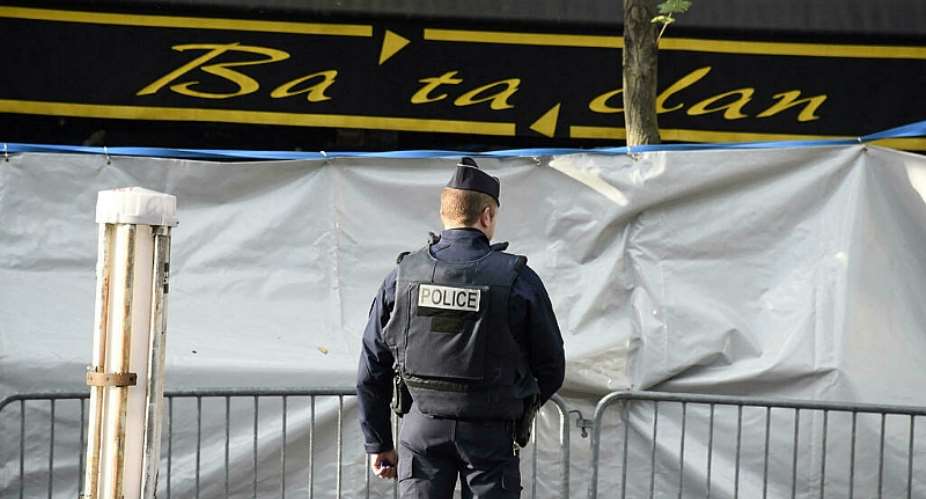This has been a particularly difficult week at the Paris terror trial, where the survivor of the Bataclan attack, and the families of victims have come to give their version of 13 November 2015. There have been tears and courage. There has been the unfailingly benevolent attention of court president, Jean-Louis Périès. And there have been smiles too.
One of Thursday's witnesses was among those who barricaded themselves into a tiny dressing room at the level of the first-floor balcony in the Bataclan.
They listened, petrified, as the killing continued outside, wondering when their turn would come.
Then someone hammered on the door. "Open up. It's the police."
Suspicious, those inside tried to reinforce their useless barricade.
One of them asked the policeman his name. "Jérémie," he answered, but with a hesitation noticed by all those cowering in terror.
Later, they were to learn that the police officer was really named Nabil. But he decided on the spur of the moment that the door would remain closed if he gave his real name.
There were smiles in the Special Criminal Court, even if the anecdote says something deeply serious about the division in French society between the Jérémies and the Nabils.
Professionals also suffer from PTSD
Among Thursday's witnesses, one man stood out. He arrived at the Bataclan voluntarily, while the attack was in progress, because that was his job. He is a police officer, a member of the night division of the Paris anti-criminal brigade.
Called by his boss, who was already inside the concert venue, fighting the terrorists with a hand-gun, the witness explained how he and his team ignored an order from a senior officer from a different service, telling them to stay out of the way, to let the specialists of the Rapid Intervention Force do their work.
The witness made a quick call to his wife, told her he loved her, and led his men into the Bataclan. Each member of the squad was given the option to withdraw. "The idea of pulling back didn't even cross our minds."
While the terrorists continued to fire intermittently from the side balcony above them, the police began the work of evacuating the injured from the main floor.
"Images which will never fade," said this man who has since had to fight profound depression, who hardly sleeps, whose marriage has collapsed, and who is incapable of being in a public place, unarmed.
Post-traumatic stress disorder is no respecter of professional status.
What is the point?
And for those who wonder if this public presentation of intimate grief serves any purpose, one of Thursday's witnesses had an answer.
"I think of all our dead," she said, "of the bereaved who continue to live, despite the hurt.
"We are here for the dead. We have to testify so that those we love remain alive."





 Lay KPMG audit report on SML-GRA contract before Parliament – Isaac Adongo tells...
Lay KPMG audit report on SML-GRA contract before Parliament – Isaac Adongo tells...
 Supervisor remanded for stabbing businessman with broken bottle and screwdriver
Supervisor remanded for stabbing businessman with broken bottle and screwdriver
 NDC watching EC and NPP closely on Returning Officer recruitment — Omane Boamah
NDC watching EC and NPP closely on Returning Officer recruitment — Omane Boamah
 Your decision to contest for president again is pathetic – Annoh-Dompreh blasts ...
Your decision to contest for president again is pathetic – Annoh-Dompreh blasts ...
 Election 2024: Security agencies ready to keep peace and secure the country — IG...
Election 2024: Security agencies ready to keep peace and secure the country — IG...
 People no longer place value in public basic schools; new uniforms, painting wil...
People no longer place value in public basic schools; new uniforms, painting wil...
 'Comedian' Paul Adom Otchere needs help – Sulemana Braimah
'Comedian' Paul Adom Otchere needs help – Sulemana Braimah
 Ejisu by-election: Only 33% of voters can be swayed by inducement — Global InfoA...
Ejisu by-election: Only 33% of voters can be swayed by inducement — Global InfoA...
 Minority will expose the beneficial owners of SML, recover funds paid to company...
Minority will expose the beneficial owners of SML, recover funds paid to company...
 Prof. Opoku-Agyemang has ‘decapitated’ the NPP’s strategies; don’t take them ser...
Prof. Opoku-Agyemang has ‘decapitated’ the NPP’s strategies; don’t take them ser...
